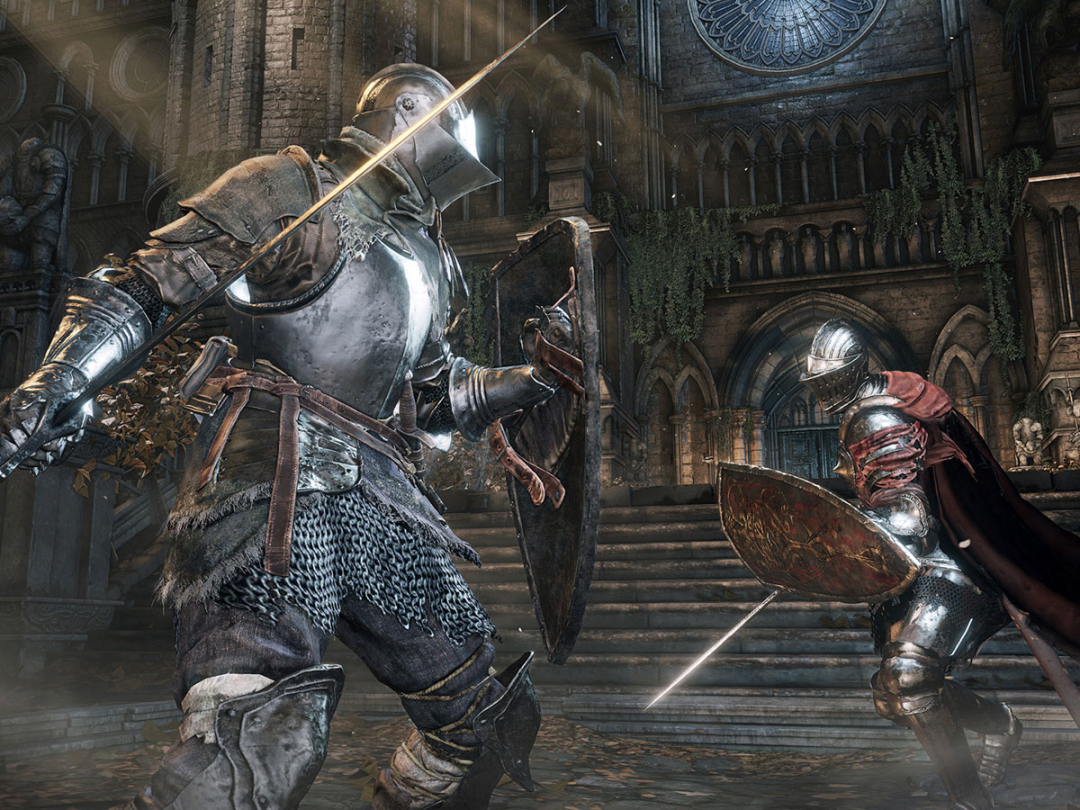Challenge mode: 10 amazing tough games you can play right now
Come and have a go if you think you’re hard enough

Think video games have got too easy? Think again.
While gamers are certainly coddled a lot more than they were a decade ago – think The Division literally drawing an on-screen line to funnel you to your next objective – there are still plenty of recent titles willing to treat us like the adults we (think we) are.
So if you’re looking for a current generation title to provide you with a worthy challenge, pick any from this list – it features all of our favourites.
Dark Souls 3 (PC, PS4 Xbox One)
Dark Souls and its sequel, along with spiritual predecessor Demon’s Souls and the intrinsically linked Bloodborne (also in this article), have established Japan’s FromSoftware – and creative mastermind Hidetaka Miyazaki – as the world’s leading lights when it comes to incredibly difficult but insanely addictive action RPGs with intricate level design, frenetic combat and memorable boss encounters.
Dark Souls 3, out this week, doesn’t mess with the formula. From the moment you encounter the game’s first boss, perhaps 10 minutes in, and get immediately pounded into the ground like a rag doll, it’s clear that age has not dimmed the Souls series’ predilection for inflicting pain on gamers.
But crucially, you’ll pick yourself (and your controller, now on the other side of the room) up, try again, a little bit more knowledgeable about his movements this time. And you’ll probably die again. But now you know even more. And so on. And then, on your third, fourth, or 25th attempt, he’ll be the one crumpling into a heap. And you’ll have done that yourself.
Of course, it’s not just the bosses that are tough. Even the lowliest of regular enemies can be deadly in numbers or if they catch you unprepared, and it’s that, as well as the game’s devious use of traps and ambushes, that makes exploring its vast, intertwining environments such a fraught experience – at least the first few times.
And the plot? While most games will spoon-feed you every detail in lengthy cutscenes, Dark Souls 3 (like all in the series) is sparse with its storytelling. In fact, most of the background information about the fantasy world it takes place in is hidden away in descriptions of magic rings, armour and the like. If you want to piece it together, FromSoft trusts you to be clever enough to do it yourself. It’s that sort of treatment that makes the game such a standout.
READ THE FULL REVIEW › Dark Souls III review
Spelunky (PC, Mac, PS3, PS4, PS Vita, Xbox 360)
There are a few roguelikes (perhaps “roguelike-likes” is a more accurate term) mentioned in this article, but Spelunky is probably the most “pure” of the lot.
A 2D dungeon-crawler in which every level is procedurally-generated and permadeath means restarting from scratch, it’s a game that’ll be totally different on each playthrough. Needless to say, it’s also bloody difficult – but not frustratingly so.
Putting you in the Indiana Jones-esque shoes of a cave-exploring treasure hunter, its levels are lethal, laden with bloodthirsty beasts and treacherous traps. But the generation algorithm never does its job unfairly, and once you begin to master your moves and the use of items such as ropes and bombs, each level becomes little more than a devious, unique puzzle to be satisfyingly solved.
RELATED › Quantum Break review
XCOM 2 (PC, Mac)
Ah, XCOM… breaking PC gamers’ hearts since the early ’90s. Microprose’s original XCOM game was famed for its near-sheer learning curve and character permadeath, and the “re-imaginings” from Sid Meier’s Firaxis gleefully maintain the trend, albeit in a tighter, streamlined and more focussed way.
XCOM 2 sees you directing a resistance movement against an alien-controlled world government, and at times it’s unforgiving – almost brutally so. A single mistake in either the strategic base-building part or the tactical mission mode of the game can lead to disaster, if not immediately then in-game weeks down the line. And this is on the second-easiest of the game’s four difficulty settings.
But when your tough choices pay off and your plans come together, there’s immense pride to be had in triumphing over the aliens’ overwhelming odds. Just remember to mourn all those dead grunts (handily viewable in a memorial gallery, along with details of precisely who and what caused their untimely demise) as you pop the cork on your victory champagne.
READ THE FULL REVIEW › XCOM 2 review
Faster Than Light (PC, Mac, IOS)
Ever wanted to be the captain of your own spaceship? Well, FTL gives you that chance, putting you in charge of a multi-roomed craft and its crew with the unenviable mission of transporting vital information to an allied fleet located eight sectors away. Why unenviable? Well, each of these sectors is filled with several procedurally-generated encounters, most of which will present you with some sort of danger.
Roving pirates, solar storms, asteroids, diseases… the list goes on. You’ll also need to avoid running out of fuel, ammunition and crew members. Oh, and did we mention you’re being pursued by a Rebel fleet hellbent on stopping you from delivering your cargo, meaning you can’t tarry too long trying to pick up supplies? And that each new sector bumps up the difficulty? Oh, and that you’ll need to fight a Rebel battle cruiser at the end of the game too.
This journey will be fraught – and on top of all that there’s permadeath, so no save scumming if a fight goes against you. Die and you’ll have to start all over, albeit with more options for ships and crew unlocked if you’ve completed certain objectives.
As with many of the games here, much of the fun comes from being constantly on the back foot. You’re the underdog here, and it never lets you forget it; you can be enjoying a good run of systems without incurring any losses, picking up new crew members, upgrading your ship’s systems and generally looking invincible when, suddenly, a chance encounter can leave you with a gaping hole in the hull and a ship leaking oxygen. Cue everyone inside rushing to patch it up, but suffocating before anything can be done.
That’s FTL in a nutshell, but after raging for five minutes, you’ll click on New Game and kick the whole punishing thing off again.
RELATED › The 30 most anticipated games of 2016
Alien: Isolation (PC, Mac, PS3, PS4, Xbox 360, Xbox One)
Most survival horror games are terrifying during the first playthrough, but the pants-soiling ceases once you’ve learned the scripted jump scares, or which areas are safe and which are full of enemies.
Not so Alien: Isolation which, by featuring a protagonist that is (a) able to go pretty much anywhere you are, but faster (b) kill you in one hit and (c) controlled 99% of the time by AI rather than scripting, manages to keep the scare-o-meter cranked up to 11 throughout.
The unpredictable AI, lack of scripted scares and paucity of save points makes this game a truly challenging experience. Rather than confront your enemy, Alien: Isolation requires that you outthink it – or at least run away really, really well.
Suffice to say, Creative Assembly has delivered one of the best hiding simulators we’ve ever played, and you’ll spend as much time sweating motionlessly inside lockers, cupboards and vents as you will exploring the eerily deserted hallways of Sevastopol Station.
READ THE FULL REVIEW › Alien: Isolation review
Don’t Starve (PC, Mac, PS3, PS4, PS Vita, Xbox 360, Xbox One, Wii U, IOS)
Don’t let the outwardly cutesy visuals fool you: Don’t Starve is a game that, from its first minute, is killing you – and the only way to stave off death is to put yourself in danger.
Developer Klei has delivered a survival simulator in which food, shelter and sanity are vital, and you’re as likely to die from lack of one of those as you are from getting eaten by the wildlife. So you must scour the procedurally-generated wilderness scavenging food to eat and materials to craft with, all the while growing your tech tree until you approach some kind of Robinson Crusoe-esque zen moment where, by golly, you’ve built yourself a self-sustaining utopia.
The goal is to stay alive for as long as possible, but once you’re dead, you’re dead. Each game has only one save, so if you do starve – and you will, believe us – there are no reloads. Only restarts.
RELATED › The Division review
Sunless Sea (PC, Mac)
Another indie game with procedural world generation and resource-based survival, Sunless Sea has a fair bit in common with Don’t Starve, but it also blends in some of the finest writing and atmosphere in gaming.
You play the captain of a ship navigating the Unterzee, a vast subterranean ocean full of wonder and wealth, if you’re willing to risk life, limb and a functioning mind to discover it.
Cthulu-esque creatures lurk beneath the waves, pirates patrol the shallows and there are all sorts of shore-based conundrums to content with. You must also balance your desire to explore potentially lucrative new areas with knowledge that fuel and food are scarce. Run out of the former and you may find yourself adrift in the black nothingness, easy prey for roaming horrors; run out of the latter and you’ll be faced with a potentially worse puzzler: which of your poor crew to eat first.
Like Don’t Starve, this is a game where death means game over, although there are certain perks and items that can be carried over to make your next playthrough that little bit easier. But not much.
RELATED › 10 of the best cheap Steam games
Super Meat Boy (PC, Mac, PS4, PS Vita, Xbox 360)
Back in the day, so the legends go, games were really, really hard – and Super Meat Boy is certainly replete with old-school sensibilities, being a 2D, 300-level platformer that requires split-second timing and finely-honed reactions.
If you’ve missed the sort of challenge afforded by the likes of Ghosts ‘n Goblins or the 8- and 16-bit Super Mario Bros. titles, Super Meat Boy is right up your pixellated alley. The titular Meat Boy is… well, a boy made of meat, and he’s attempting to rescue a damsel in distress (she’s made out of bandages, by the way). She happens to be located on the other side of many, many screens of blades, needles, enemies and bosses.
Will you break a controller playing this? It’s possible. Expect frustration, rage and an incredible feeling of satisfaction when your thumbs finally do their jobs, you nail the timing and you make it through a particularly gruelling level. As one Steam reviewer memorably puts it, “This is a bad game, and that’s why I’ve played it for 2000 hours.”
Bloodborne (PS4)
A Souls game in all but name, Bloodborne was created by FromSoftware specially for the PlayStation 4, and some (this writer included) would say it’s the finest game currently available for Sony’s console.
It’s difficult in the same way other Souls games are, requiring that you learn enemies’ movements and positions and master whatever form of combat you’ve chosen, all the while exploring a deadly, beautifully designed world that circles and flows back on itself in various surprising ways.
But while Dark Souls gives you a shield to cower behind as you inch through its passages, the faster-paced Bloodborne forces you into aggressive action, its ingenious Regain mechanic allowing you to recover recently lost health by quickly tearing into foes. There’s nothing cheap or unfair here though, and every time you die you’ll learn something, leading to those utterly uplifting moments when a boss that once flattened you in seconds becomes little more than fodder for your whirling Saw Cleaver.
There’s something almost transcendent in the way Bloodborne turns you into a master by degrees – but it’s wise never to get too comfortable, because there’s generally something bigger, nastier and more shocking around the next corner to bring you back down to earth with a bump. May the good blood guide your way, hunter.
READ FULL REVIEW › Bloodborne review
Trials Fusion (PC, PS4, Xbox One, Xbox 360)
While all the other titles here have combat somewhere at their forefront, Trials is a game where your only real enemies are gravity, force and inertia. You’re riding a motocross bike, you see, and attempting to perform tricks, look awesome and (mainly) not land on your head like a big wally.
Trials titles have 3D graphics but play on a 2D plane; your bike travels sideways, up and down across various insane stunt tracks, but you don’t have to worry about it coming towards or away from the camera. Don’t assume having one fewer axis to contend with makes the challenge of keeping your ride right-sided any easier, though; this is a game where an understanding of physics and timing is absolutely key, and it’s very unforgiving.
On the flip side, it’s fast-paced, allowing you to restart the track moments after you crash – and occasionally you’ll pull off a move so ludicrously unlikely that the pain of multiple wipeouts fades, leaving only joy and an immense feeling of satisfaction. Which immediately fades when you start on the next, even harder track.
RELATED › The 10 best games in the world right now



